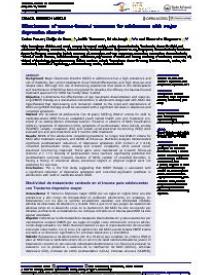Effectiveness of trauma-focused treatment for adolescents with major depressive disorder
Background: Major Depressive Disorder (MDD) in adolescence has a high prevalence and risk of disability, but current treatments show limited effectiveness and high drop-out and relapse rates. Although the role of distressing experiences that relate to the development and maintenance of MDD has been recognized for decades, the efficacy of a trauma-focused treatment approach for MDD has hardly been studied.
Objective: To determine the effectiveness of eye movement desensitization and reprocessing (EMDR) therapy as a stand-alone intervention in adolescents diagnosed with MDD. We hypothesized that reprocessing core memories related to the onset and maintenance of MDD using EMDR therapy would be associated with a significant decrease in depressive and comorbid symptoms.
Method: We recruited 32 adolescents (12–18 years) fulfilling DSM-IV criteria for mild to moderate-severe MDD from an outpatient youth mental health care unit. Treatment consisted of six weekly 60-min individual sessions. Presence or absence of MDD classification (ADIS-C), symptoms of depression (CDI), symptoms of posttraumatic stress (UCLA), anxiety (SCARED), somatic complaints (CSI), and overall social-emotional functioning (SDQ) were assessed pre and post-treatment and 3 months after treatment.
Results: 60.9% of the adolescents completing treatment no longer met DSM-IV criteria for MDD after treatment anymore, and 69.8% at follow-up. Multilevel analyses demonstrated significant posttreatment reductions of depressive symptoms (CDI: Cohen’s d = 0.72), comorbid posttraumatic stress, anxiety and somatic complaints, while overall socialemotional functioning improved. These gains were maintained at 3-month follow-up (Cohen’s d = 1.11). Severity of posttraumatic stress reactions significantly predicted the posttreatment outcome; however, duration of MDD, number of comorbid disorders, or having a history of emotional abuse, emotional neglect or physical neglect were not predictive for outcome.
Conclusions: This is the first study suggesting that EMDR therapy is associated with a significant reduction of depressive symptoms and comorbid psychiatric problems in adolescents with mild to moderate-severe MDD.
HIGHLIGHTS
• Major Depressive Disorder (MDD) can be treated in adolescents using a trauma focused treatment approach.
• EMDR therapy is effective in adolescents with a primary diagnosis of MDD.
• Sixty percent no longer fulfilled the MDD diagnosis after 6 sessions of EMDR.
• Symptoms of anxiety, posttraumatic stress, somatic complaints also decreased significantly and overall social-emotional functioning improved.
Geachte bezoeker,
De informatie die u nu opvraagt, kan door psychotraumanet niet aan u worden getoond. Dit kan verschillende redenen hebben,
waarvan (bescherming van het) auteursrecht de meeste voorkomende is. Wanneer het mogelijk is om u door te verwijzen naar de bron
van deze informatie, dan ziet u hier onder een link naar die plek.
Als er geen link staat, kunt u contact opnemen met de bibliotheek,
die u verder op weg kan helpen.
Met vriendelijke groet,
Het psychotraumanet-team.
In: European Journal of Psychotraumatology, ISSN 2000-8066 | 10 | 1
https://doi.org/10.1080/20008198.2019.1682931
Online verschenen 08/11/2019


